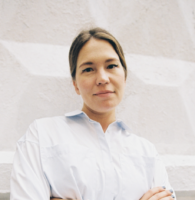Call for Lightning Talks: NOW CLOSED
A cornerstone of our workshop is inviting submissions from early career persons who identify as a member of an underrepresented group to present their work in HPC as a short lightning talk. For those who are chosen to present, there will be the opportunity to meet with leaders and employers from across the HPC community at this workshop, giving you an opportunity to discuss your work with them.
Submissions for talks are invited as extended abstracts (up to 2 pages) in any area that utilizes High-Performance Computing. Successful authors will be asked to provide a version of their work highlighting its goals, accomplishments, and impact to present on no more than three slides. Authors are also expected to give a short lightning talk (3 minutes) at the workshop itself.
We encourage anyone from an underrepresented group who considers themselves to be ‘early career’ (i.e., still studying, within five years of graduation, or within five years of transition into the field) to participate. However, this opportunity is open to help everyone who feels they may benefit from presenting their work, irrespective of career stage. As HPC is a large community that encompasses many different roles, we welcome both technical and non-technical contributors to submit about their work in order to broaden the knowledge of all those to attend our workshop.
TRAVEL, ATTENDANCE AND FELLOWSHIPS
Please note, both digital and in-person presentation options are possible for the workshop at this year’s SC23 conference. Those authors who are successful must make their preference known within your initial submission. Would you like to present in-person but are concerned about cost? We are pleased to announce that successful Early Career speakers will be eligible to apply for a travel fellowship thanks to our Champions, DoITNow! This fellowship will be able to cover up to £3,000 in costs for two our our successful lightning talk speakers. To apply:
- Submit your talk abstract.
- Once you have been accepted you will be invited to apply for the fellowship.
- The application is simple statement of intent as to why we should select you as the bursary recipient.
- Your talk abstract score and your fellowship submission score will be added together and averaged to come up with a final score for your application.
- The two authors with the highest total average will be awarded the fellowships.
Past fellowship recipients have put great care into both their speaking and fellowship submissions. Each woman clearly outlined what they hoped to gain in attending and how they would best utilise the time spent at conference. Need a bit more inspiration? Check out an interview from one of our most recent Early Career speaker and award-winner, by heading to the ISC May 22, 2023 video from HPCWire!
BENEFITS OF PARTICIPATING
- Present: Successful authors will present their work in a supportive environment, including an audience of peers and leading women across the international HPC community.
- Networking: build your HPC network, make new contacts and chat with potential employers.
- Advice and mentoring: Receive expert advice and mentorship to help prepare for your presentation, including slides, how to deliver effective, in-person communication and how to make the most of the networking time available.
ABOUT SUBMISSIONS
Submissions are invited on all topics relating to HPC from users and developers. All abstracts should emphasize the impact of the work, such as the problem you are seeking to solve, the community benefits from investigating this work with or alongside HPC, the computational resources and/or facilities used, any challenges noted and/or overcome, as well as any other challenges you wish to highlight.
There are three key areas we would like you to highlight in your lightning talk. These are:
- Objectives of the work being discussed;
- Accomplishments so far;
- Goals of the work.
You will be asked to send us your slides in advance of the workshop.
Details to be made available on that process soon.
READY TO SUBMIT YOUR ABSTRACT?
See details for the submission on: http://submissions.supercomputing.org
Our submission section is located at the bottom of the main page (after login) under ‘Women in HPC’ Workshop. Please note, you will need to set-up an account to make a submission. Once done this account will remain active for this and any future Supercomputing Conference (SC) submissions you choose to make.
Important dates and deadlines:
- Workshop: November 13, 2023
- Networking Reception: November 14, 2023
Past deadlines:
- Poster Submissions Open: June 23, 2023
- Poster Submissions CLOSE:
August 4, 2023extended August 18, 2023 - Notification Date: September 8, 2023
- Programme Publication: September 18, 2023
- Final Materials Due: September 29, 2023
Full details on preparation of talks will be send to successful authors – information coming soon.
Questions? Please contact us at info@womeninhpc.org


 Ayesha
Ayesha Dr. Anjus George works at the Oak Ridge National Laboratory that powers the some of the world’s fastest supercomputers like Summit and Frontier. She is the author of the technical report “Understanding Lustre Internals Second Edition” that serves as the foundational document for Lustre developers all over the world. Besides Lustre, she leads the research on QuickSilver, a data management solution for multi-tier, large-scale storage systems. She conducts explorative studies on HPC storage performance, data durability schemes, and failure trends. Her passion also lies in Edge computing, particularly in boosting the performance of Edge ecosystem components. Prior to joining ORNL, she obtained her Ph.D. in Computer Science from University of North Carolina at Charlotte where she created a distributed messaging framework for computer vision applications called Mez, that achieved a 10.1x latency improvement over state-of-the-art systems. She is also the recipient of two Best Paper awards in international Edge conferences.
Dr. Anjus George works at the Oak Ridge National Laboratory that powers the some of the world’s fastest supercomputers like Summit and Frontier. She is the author of the technical report “Understanding Lustre Internals Second Edition” that serves as the foundational document for Lustre developers all over the world. Besides Lustre, she leads the research on QuickSilver, a data management solution for multi-tier, large-scale storage systems. She conducts explorative studies on HPC storage performance, data durability schemes, and failure trends. Her passion also lies in Edge computing, particularly in boosting the performance of Edge ecosystem components. Prior to joining ORNL, she obtained her Ph.D. in Computer Science from University of North Carolina at Charlotte where she created a distributed messaging framework for computer vision applications called Mez, that achieved a 10.1x latency improvement over state-of-the-art systems. She is also the recipient of two Best Paper awards in international Edge conferences. Dr. Mozhgan Kabiri Chimeh joined NVIDIA in January 2020, helping bring GPU and HPC to the growing user community in Europe and worldwide. She leads the hackathons and boot camps in the EMEA region. She is a community builder passionate about open-source software and is actively involved in the HPC and RSE communities. As a Software Sustainability Institute Fellow and Research Software Engineer (RSE) advocate, she actively promotes reproducible and sustainable software using HPC, particularly GPUs, through training, seminars, research software consultancy, and outreach. Before joining NVIDIA, Mozhgan was a post-doctoral researcher in massive-scale complex systems simulation with accelerated computing at the University of Sheffield, UK. She worked in complex system modelling using emerging high-performance parallel architectures.
Dr. Mozhgan Kabiri Chimeh joined NVIDIA in January 2020, helping bring GPU and HPC to the growing user community in Europe and worldwide. She leads the hackathons and boot camps in the EMEA region. She is a community builder passionate about open-source software and is actively involved in the HPC and RSE communities. As a Software Sustainability Institute Fellow and Research Software Engineer (RSE) advocate, she actively promotes reproducible and sustainable software using HPC, particularly GPUs, through training, seminars, research software consultancy, and outreach. Before joining NVIDIA, Mozhgan was a post-doctoral researcher in massive-scale complex systems simulation with accelerated computing at the University of Sheffield, UK. She worked in complex system modelling using emerging high-performance parallel architectures. Cristin Merritt serves as Chief Marketing Officer (CMO) for Alces Flight. With over 20 years of experience in enterprise technology, and over 7 in HPC, Cristin’s skills are focused on understanding technology market trends, specifically in finding the intersection between hardware, software, and people, in order to bring about successful supercomputing solutions. At Alces Flight, Cristin has served within the partners and program teams, successfully launching complex integration projects, of which three have so far gone on to win global recognition for their accomplishments in multi-platform (hybrid) HPC.
Cristin Merritt serves as Chief Marketing Officer (CMO) for Alces Flight. With over 20 years of experience in enterprise technology, and over 7 in HPC, Cristin’s skills are focused on understanding technology market trends, specifically in finding the intersection between hardware, software, and people, in order to bring about successful supercomputing solutions. At Alces Flight, Cristin has served within the partners and program teams, successfully launching complex integration projects, of which three have so far gone on to win global recognition for their accomplishments in multi-platform (hybrid) HPC. Eleanor Broadway is an Applications Consultant at EPCC, the University of Edinburgh. She works as a Research Software Engineer (RSE) to support the UK’s national supercomputer, ARCHER2, providing in-depth user support, implementation of service improvements and a comprehensive training programme. She participates in a variety of technical projects (including PRACE, HPC-Europa, CompBioMed and NetZero) to conduct detailed performance investigations, porting applications to GPUs and assess the energy efficiency of AI. She is also involved in teaching as a course tutor and MSc supervisor, has an active role in EPCC’s outreach programme and regularly contributes to and volunteers at community events.
Eleanor Broadway is an Applications Consultant at EPCC, the University of Edinburgh. She works as a Research Software Engineer (RSE) to support the UK’s national supercomputer, ARCHER2, providing in-depth user support, implementation of service improvements and a comprehensive training programme. She participates in a variety of technical projects (including PRACE, HPC-Europa, CompBioMed and NetZero) to conduct detailed performance investigations, porting applications to GPUs and assess the energy efficiency of AI. She is also involved in teaching as a course tutor and MSc supervisor, has an active role in EPCC’s outreach programme and regularly contributes to and volunteers at community events.
 Anastasiia Sarmakeeva is a Ph.D. candidate in computational fluid dynamics at Professor Lorena Barba’s lab in Washington, D.C., originally from the Udmurt Republic in Russia. Her research focuses on applying computational methods of landslide simulations. Previously, Anastasiia worked in parallel computations and developed a new algorithm for sparse matrix inversion on GPUs. In 2018-2019, she got Ernst Mach scholarship for research in Austria; in 2019-2020, she came to the US with the Fulbright program. She believes diversity in science and technology leads to more innovative and inclusive solutions.
Anastasiia Sarmakeeva is a Ph.D. candidate in computational fluid dynamics at Professor Lorena Barba’s lab in Washington, D.C., originally from the Udmurt Republic in Russia. Her research focuses on applying computational methods of landslide simulations. Previously, Anastasiia worked in parallel computations and developed a new algorithm for sparse matrix inversion on GPUs. In 2018-2019, she got Ernst Mach scholarship for research in Austria; in 2019-2020, she came to the US with the Fulbright program. She believes diversity in science and technology leads to more innovative and inclusive solutions. 2023 Keynote Speaker
2023 Keynote Speaker Brendan Bouffler has 25 years of experience in the global tech industry creating large-scale systems for HPC environments, and has been responsible for designing and building hundreds of HPC systems for researchers and engineers, all over the world. Quite a number of these efforts fed the TOP500 list, a few that placed in the top 5.
Brendan Bouffler has 25 years of experience in the global tech industry creating large-scale systems for HPC environments, and has been responsible for designing and building hundreds of HPC systems for researchers and engineers, all over the world. Quite a number of these efforts fed the TOP500 list, a few that placed in the top 5. Suzanne Parete-Koon is a High-Performance Computing Engineer at the Oak Ridge Leadership Computing Facility (OLCF), located at Oak Ridge National Laboratory (ORNL). She is responsible for supporting scientific applications running on Frontier and other HPC resources at ORNL.
Suzanne Parete-Koon is a High-Performance Computing Engineer at the Oak Ridge Leadership Computing Facility (OLCF), located at Oak Ridge National Laboratory (ORNL). She is responsible for supporting scientific applications running on Frontier and other HPC resources at ORNL. Annie Ma-Weaver is the Group PM for HPC and works to build products and solutions to enable scientists, researchers and engineers to run HPC workloads on Google Cloud. She has been with Google for 13+ years in roles including Chief of Staff, Strategy and BD. Before Google, Annie conducted behavioural economics research at Columbia Business School, worked in investment banking in Hong Kong and consulted for the Scottish government. Annie received an MBA from the Haas School of Business and a BA in Economics and Psychology from Columbia University.
Annie Ma-Weaver is the Group PM for HPC and works to build products and solutions to enable scientists, researchers and engineers to run HPC workloads on Google Cloud. She has been with Google for 13+ years in roles including Chief of Staff, Strategy and BD. Before Google, Annie conducted behavioural economics research at Columbia Business School, worked in investment banking in Hong Kong and consulted for the Scottish government. Annie received an MBA from the Haas School of Business and a BA in Economics and Psychology from Columbia University. Bill Magro Chief Technologist for HPC at Google, where he drives strategy and customer success for Google Cloud. Magro joined Google in 2020, after 20 years at Intel, where he was Intel Fellow and Chief Technologist for HPC. A recognized leader in the InfiniBand industry, Magro helped found the OpenFabrics Alliance and served as InfiniBand Trade Association TWG co-chair from 2007-2020. He holds a B.Eng in applied and engineering physics from Cornell University and Ph.D. in physics from the University of Illinois.
Bill Magro Chief Technologist for HPC at Google, where he drives strategy and customer success for Google Cloud. Magro joined Google in 2020, after 20 years at Intel, where he was Intel Fellow and Chief Technologist for HPC. A recognized leader in the InfiniBand industry, Magro helped found the OpenFabrics Alliance and served as InfiniBand Trade Association TWG co-chair from 2007-2020. He holds a B.Eng in applied and engineering physics from Cornell University and Ph.D. in physics from the University of Illinois. Dr. Elisabeth Ortega is a Theoretical Chemist converted to an HPC specialist. Since she was a child, she has been an enthusiast of science and technology, and it motivated her to get a first degree in chemistry and a second one in computer science, followed by a master’s degree and a Ph.D. in theoretical and computational chemistry. She tasted the HPC world, being the only system administrator of the chemistry department for one year, just to pay the bills when her doctorate scholarship ended, but she realized that the academy life was not for her, and moved to the industry right after presenting her dissertation.
Dr. Elisabeth Ortega is a Theoretical Chemist converted to an HPC specialist. Since she was a child, she has been an enthusiast of science and technology, and it motivated her to get a first degree in chemistry and a second one in computer science, followed by a master’s degree and a Ph.D. in theoretical and computational chemistry. She tasted the HPC world, being the only system administrator of the chemistry department for one year, just to pay the bills when her doctorate scholarship ended, but she realized that the academy life was not for her, and moved to the industry right after presenting her dissertation. Laura Schulz is currently the department head of Quantum Computing and Technologies at the Leibniz Supercomputing Centre (LRZ) in Garching, Germany. She drives multiple efforts toward integrating emerging quantum accelerators into several layers of the high-performance computing (HPC) ecosystem. Laura is the PI for Germany’s Euro-Q-Exa project to seat a EuroHPC Joint Undertaking quantum system in Bavaria and manages a robust portfolio of funded projects and a great team to achieve LRZ’s quantum strategy. Before joining LRZ, she was part of the Computation directorate at Lawrence Livermore National Laboratory (LLNL) as well as LLNL’s High Performance Computing Innovation Center (HPCIC). Recently, Laura was named an HPCWire 2023 Person to Watch.
Laura Schulz is currently the department head of Quantum Computing and Technologies at the Leibniz Supercomputing Centre (LRZ) in Garching, Germany. She drives multiple efforts toward integrating emerging quantum accelerators into several layers of the high-performance computing (HPC) ecosystem. Laura is the PI for Germany’s Euro-Q-Exa project to seat a EuroHPC Joint Undertaking quantum system in Bavaria and manages a robust portfolio of funded projects and a great team to achieve LRZ’s quantum strategy. Before joining LRZ, she was part of the Computation directorate at Lawrence Livermore National Laboratory (LLNL) as well as LLNL’s High Performance Computing Innovation Center (HPCIC). Recently, Laura was named an HPCWire 2023 Person to Watch. 2023 WHPC Travel Fellow
2023 WHPC Travel Fellow 2023 WHPC Travel Fellow
2023 WHPC Travel Fellow
 Dr. Vijayalakshmi Saravanan is currently working as Assistant Professor, Computer Science, at the University of South Dakota. Prior to this, she was a Visiting Assistant Professor, Computer Science, Vassar College, NY and an Adjunct Faculty at Rochester Institute of Technology, USA. Earlier she was a Postdoctoral Associate at University at Buffalo, SUNY, USA and University of Waterloo, Canada under the prestigious “Schlumberger Faculty for the Future” Fellowship award (2015-2017). She completed her Ph.D. under the prestigious Erasmus Mundus EU-Govt Fellowship award at Malardalen University, Sweden as a research exchange student. Prior to this, she was Assistant Professor of Practice at UTSA, USA. She is serving as a program committee member for reputed conferences & journals such as GHC, SIGCSE and Springer. Her research interests include Big Data in Healthcare, AI, Data Analytics/Visualization and Power-Aware Processor Design. She is also a lead editor for Pattern Recognition Letters (2020), Special Issue of Multimedia Tools and Applications (2020) and CRC Press Taylor & Francis, USA. She is a Senior Member of IEEE, ACM, ACM Distinguished speaker, CSI and Chair of IEEE WIE Affinity Group at VIT University during 2009-2015, Chair of NPA (National Postdoctoral Association) Annual Meetings, SRP-HPC ECP Fellow, and a Board Member of N2WOMEN.
Dr. Vijayalakshmi Saravanan is currently working as Assistant Professor, Computer Science, at the University of South Dakota. Prior to this, she was a Visiting Assistant Professor, Computer Science, Vassar College, NY and an Adjunct Faculty at Rochester Institute of Technology, USA. Earlier she was a Postdoctoral Associate at University at Buffalo, SUNY, USA and University of Waterloo, Canada under the prestigious “Schlumberger Faculty for the Future” Fellowship award (2015-2017). She completed her Ph.D. under the prestigious Erasmus Mundus EU-Govt Fellowship award at Malardalen University, Sweden as a research exchange student. Prior to this, she was Assistant Professor of Practice at UTSA, USA. She is serving as a program committee member for reputed conferences & journals such as GHC, SIGCSE and Springer. Her research interests include Big Data in Healthcare, AI, Data Analytics/Visualization and Power-Aware Processor Design. She is also a lead editor for Pattern Recognition Letters (2020), Special Issue of Multimedia Tools and Applications (2020) and CRC Press Taylor & Francis, USA. She is a Senior Member of IEEE, ACM, ACM Distinguished speaker, CSI and Chair of IEEE WIE Affinity Group at VIT University during 2009-2015, Chair of NPA (National Postdoctoral Association) Annual Meetings, SRP-HPC ECP Fellow, and a Board Member of N2WOMEN. Nan Ding is an early career researcher at LBNL. She accomplished her PhD at Tsinghua University in 2018 and became a postdoc at LBNL until 2021. Nan’s research interests include high-performance computing and performance modelling. She is also a proud mother of two toddlers.
Nan Ding is an early career researcher at LBNL. She accomplished her PhD at Tsinghua University in 2018 and became a postdoc at LBNL until 2021. Nan’s research interests include high-performance computing and performance modelling. She is also a proud mother of two toddlers. K. Grace Johnson is a Research Engineer at Hewlett Packard Labs where she works on integrating quantum computing with supercomputing. She received her PhD in Chemical Physics in 2023 from Stanford University where she studied with Prof. Todd Martinez. During her PhD, Grace was a U.S. Department of Energy Computational Science Graduate Fellow, and in her research developed frameworks to parallelize and accelerate quantum chemistry simulations for HPC as well as simulating quantum circuits using tensor network methods. Her current work aims to develop hybrid quantum/classical approaches to solve challenging real-world problems in the near term. Grace is originally from Salt Lake City, Utah but now calls the SF Bay Area home.
K. Grace Johnson is a Research Engineer at Hewlett Packard Labs where she works on integrating quantum computing with supercomputing. She received her PhD in Chemical Physics in 2023 from Stanford University where she studied with Prof. Todd Martinez. During her PhD, Grace was a U.S. Department of Energy Computational Science Graduate Fellow, and in her research developed frameworks to parallelize and accelerate quantum chemistry simulations for HPC as well as simulating quantum circuits using tensor network methods. Her current work aims to develop hybrid quantum/classical approaches to solve challenging real-world problems in the near term. Grace is originally from Salt Lake City, Utah but now calls the SF Bay Area home. Jenny Wong holds a BSc, MMath in Mathematics and a PhD, in Fluid Dynamics from the University of Leeds. After her PhD, she spent 3 years in France at l’Institut de Physique du Globe de Paris and l’Institut des Sciences de la Terre for her postdoctoral research investigating the dynamics of the Earth’s core, using mathematical and numerical models. Jenny joined The University of Birmingham’s Research Software Group as a Senior Research Software Engineer in December 2021. Since then, she has collaborated on various research software coding projects from the School of Medicine and the School of Engineering, and provides HPC support to Baskerville, a national UK Tier 2 service, to enhance accessibility and performance of research software using GPU resources.
Jenny Wong holds a BSc, MMath in Mathematics and a PhD, in Fluid Dynamics from the University of Leeds. After her PhD, she spent 3 years in France at l’Institut de Physique du Globe de Paris and l’Institut des Sciences de la Terre for her postdoctoral research investigating the dynamics of the Earth’s core, using mathematical and numerical models. Jenny joined The University of Birmingham’s Research Software Group as a Senior Research Software Engineer in December 2021. Since then, she has collaborated on various research software coding projects from the School of Medicine and the School of Engineering, and provides HPC support to Baskerville, a national UK Tier 2 service, to enhance accessibility and performance of research software using GPU resources. Dr. Nwamaka Okafor is currently a Postdoctoral Appointee at Argonne National Laboratory. Her work focuses on developing novel methods for analyzing High Performance Computing (HPC) systems logs as well as developing robust and interpretable AI models to improve HPC systems operations and efficiencies. She received her PhD in Electrical and Electronic Engineering (2022) from University College Dublin, Ireland where her research focused on applying AI and IoTs in environmental monitoring. Amaka holds a masters degree in Computer Forensics and Cyber Security from the University of Greenwich London. She also holds a postgraduate diploma in Information Management Technology from Federal University of Technology Owerri and a Higher National Diploma in Computer Science from Federal Polytechnic Nekede, Owerri, Nigeria.
Dr. Nwamaka Okafor is currently a Postdoctoral Appointee at Argonne National Laboratory. Her work focuses on developing novel methods for analyzing High Performance Computing (HPC) systems logs as well as developing robust and interpretable AI models to improve HPC systems operations and efficiencies. She received her PhD in Electrical and Electronic Engineering (2022) from University College Dublin, Ireland where her research focused on applying AI and IoTs in environmental monitoring. Amaka holds a masters degree in Computer Forensics and Cyber Security from the University of Greenwich London. She also holds a postgraduate diploma in Information Management Technology from Federal University of Technology Owerri and a Higher National Diploma in Computer Science from Federal Polytechnic Nekede, Owerri, Nigeria. Dr. Bethany Lusch is a Computer Scientist in the data science group at the Argonne Leadership Computing Facility at Argonne National Lab. Her research expertise includes developing methods and tools to integrate AI with science, especially for dynamical systems and PDE-based simulations. Her recent work includes developing machine-learning emulators to replace expensive parts of simulations, such as computational fluid dynamics simulations of engines and climate simulations. She is also working on methods that incorporate domain knowledge in machine learning, representation learning, and using machine learning to analyze supercomputer logs. She holds a PhD and MS in applied mathematics from the University of Washington and a BS in mathematics from the University of Notre Dame.
Dr. Bethany Lusch is a Computer Scientist in the data science group at the Argonne Leadership Computing Facility at Argonne National Lab. Her research expertise includes developing methods and tools to integrate AI with science, especially for dynamical systems and PDE-based simulations. Her recent work includes developing machine-learning emulators to replace expensive parts of simulations, such as computational fluid dynamics simulations of engines and climate simulations. She is also working on methods that incorporate domain knowledge in machine learning, representation learning, and using machine learning to analyze supercomputer logs. She holds a PhD and MS in applied mathematics from the University of Washington and a BS in mathematics from the University of Notre Dame. Jade Buzinski is mathematics Masters student at Arizona State University (ASU) as part of a 4+1 program, working in the HPC-adjacent Computational Research Accelerator as a student researcher and software engineer. Jade has been driving an international research project that applies machine learning techniques to experimentally obtained stratified-fluid mixing data, in an effort to reduce the barrier to discovering fundamental science that has implications for better modeling the global climate. Jade was awarded travel to this conference (supercomputing) by the Rocky Mountain Advanced Computing Consortium (RMACC) as a result of the Student Poster Competition at the May RMACC HPC symposium. Jade is currently serving as Vice President in ASU’s Association for Women in Mathematics (AWM) student chapter, and regularly participates in RMACC’s DEI meetings. After the Masters, Jade plans on pursing her Ph.D. to continue her research in HPC-enabled applied and computational mathematics, specifically in inverse problems and artificial intelligence.
Jade Buzinski is mathematics Masters student at Arizona State University (ASU) as part of a 4+1 program, working in the HPC-adjacent Computational Research Accelerator as a student researcher and software engineer. Jade has been driving an international research project that applies machine learning techniques to experimentally obtained stratified-fluid mixing data, in an effort to reduce the barrier to discovering fundamental science that has implications for better modeling the global climate. Jade was awarded travel to this conference (supercomputing) by the Rocky Mountain Advanced Computing Consortium (RMACC) as a result of the Student Poster Competition at the May RMACC HPC symposium. Jade is currently serving as Vice President in ASU’s Association for Women in Mathematics (AWM) student chapter, and regularly participates in RMACC’s DEI meetings. After the Masters, Jade plans on pursing her Ph.D. to continue her research in HPC-enabled applied and computational mathematics, specifically in inverse problems and artificial intelligence.












